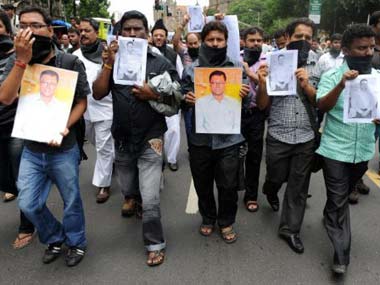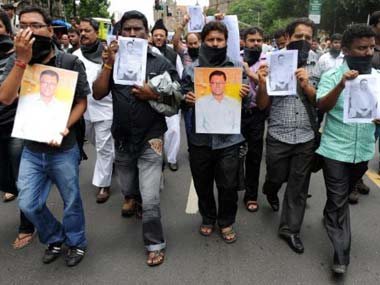If the murder of journalist Jay Dey of Mumbai’s Mid Day newspaper on Saturday was really the handiwork of the oil mafia, the moral blame for it rests squarely with the Union and state governments.
Reason: the oil mafia exists solely because of the excessive subsidisation of kerosene. This aam aadmi fuel is at the heart of a Rs 10,000 crore pilferage racket centred in Maharashtra. Kerosene is routinely siphoned out of tankers leaving oil depots and used to adulterate other fuels, especially diesel. (See oil theft on camera).
The UPA government, however, has not found the moral courage to raise kerosene prices to a level where it won’t be used for adulteration. While kerosene has always been subsidised, the subsidy levels are now so high - the oil companies lose nearly Rs 30 for every litre of kerosene sold - that it is practically an invitation to the mafia to come and make money. And murder the people who get in their way.
[caption id=“attachment_25036” align=“alignleft” width=“380” caption=“Mr Gandhi, we have news for you. J Dey has just been murdered for doing something to expose the oil mafia.AFP Photo”]
 [/caption]
[/caption]
Dey was apparently about to write an expos on the oil mafia when he was murdered, but he isn’t the first one to be martyred in the cause of a foolish subsidisation policy.
On January 25 this year, Yeshwant Sonawane, an Additional District Collector of Malegaon in Maharashtra, was set on fire and burnt alive by a member of the mafia when he had apparently caught one of them red-handed while pilfering kerosene from a tanker.
Impact Shorts
More ShortsIn 2005, an Indian Oil employee, S Manjunath, was murdered by the mafia for seeking to stop pilferage.
A year later, to prevent adulteration, the government introduced a coloured chemical in the kerosene to enable buyers of adulterated fuels to know if kerosene had been mixed in it. But for unknown reasons, the scheme was discontinued in 2009.
An India Today report on India’s mafias says that governments have been turning a blind eye to adulteration because higher-ups in the political class were probably involved in it. “Popat Dattu Shinde, the oil king and prime accused in Sonawane’s murder (who also died of burns), had countless cases of adulteration pending against him but evaded arrest because of strong political connections,” says the magazine.
This is probably why a 1995 report on the oil mafia by a Maharashtra bureaucrat found no takers. Former Nashik Divisional Commissioner Leena Mehendale, the author of this report, was quoted by India Today as saying that nothing had been done on her report. Nashik is a key centre in India’s oil adulteration business.
After the Sonawane murder, Petroleum Minister Jaipal Reddy talked about reintroducing the marker scheme and GPS tracking of oil tankers to prevent adulteration. We haven’t heard from him since.
The Congress heir-apparent, Rahul Gandhi , expressed shock at the murder of Sonawane and said good people must join the political system for bringing about change. A news agency quoted him as saying in January: “I am shocked that such an incident took place and the government must ensure that such a crime is not repeated again. If the average person wants to do good, then he or she should be allowed to be a part of the political system and change the structure for the betterment of the country.”
Well, Mr Gandhi, we have news for you. J Dey has just been murdered for doing something to expose the oil mafia.
The only sensible way to deal with adulteration is to make it uneconomical. This means raising kerosene prices to market levels, and identifying the poor for direct subsidisation through cash payments.
Else, more Deys will be martyred in the cause of the aam aadmi, who anyway doesn’t get much of this subsidy. Currently, 40% of kerosene is estimated to be diverted for adulteration.
)